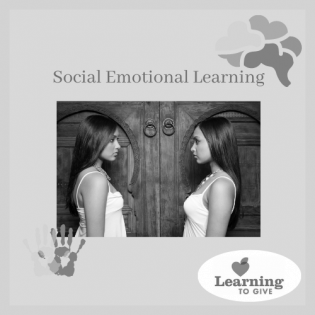SEL: Hyphen Stories
Keywords:
Citizenship
Perspective
Relationship Skills
Social Awareness
Many American citizens with a "hyphenated ethnicity, race, or identity" experience a double consciousness. In this activity, youth look at the hyphen from the perspective of another person, reflecting upon their own opinions about how the hyphen is used. This Hyphen-Stories activity is inspired by an article by Dena Simmons called, "Why We Can't Afford Whitewashed Social-Emotional Learning."
SEL Connection:
- Social-Awareness: practice empathy; take another's perspective
- Relationship Skills: communicate effectively
Warm-Up
- Define hyphenated American as an American citizen who can trace their ancestry to another ethnicity or part of the world or their identity to an unique trait. Examples include African American or Irish American or LGBTQ American (so-called because terms like Asian American are often written with a hyphen).
- Watch one or two of the New York Times Hyphen Nation videos in which individual Americans express when they feel least or most American. They describe how their country both embraces and rejects them.
- Discuss the video(s) together, especially how the person feels about being an American and how it feels when people talk to them as if they are "other" than American.
- You may allow some time for watching more videos on their own.
Activity Instructions
- Distribute the Hyphen Stories handout below. Review and discuss the directions.
- Brainstorm together possible story ideas, which may arise from personal experiences or experiences of friends. The stories may include people who experience "othering" for any identity or health trait. Allow reflections to be expressed in many different formats - using Art, Music, Video reflection or Poetry.
- Allow time to draft a hyphen story. Use peer editing and revision strategies to help writers improve their narratives.
- When they are comfortable with their drafts, ask writers to share their narratives aloud or in a virtual space.
Whole Group Discussion Questions
- How do you develop empathy for your character if their experience is not like yours?
- How do you feel about the use of a hyphen in describing identities? What is the purpose of the hyphen and why might it feel like a mark of bias or "othering"?
- What does it feel like to have a hyphenated descriptor added, when we are all American?
- Why does a question like "Where are you from?" feel biased? What is a better way to ask that shows interest with respect?
Self Reflection Writing Prompts
- What are some thoughts or feelings that arose during this activity?
- After hearing several stories, what country, race, or ethnicity would you like to learn more about?
Wrap Up
Share the edited stories in Flipgrid, in a public place, or other virtual environment. Provide an introduction and reflection questions with the stories to stimulate conversation and awareness.
Extension
- Suggested Reading for Facilitator Why We Can't Afford Whitewashed Social-Emotional Learning by Dena Simmons
